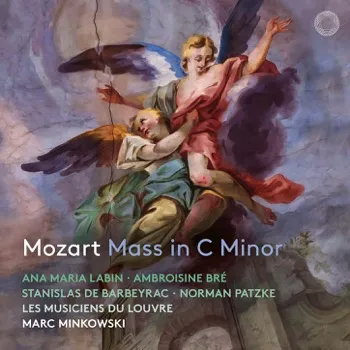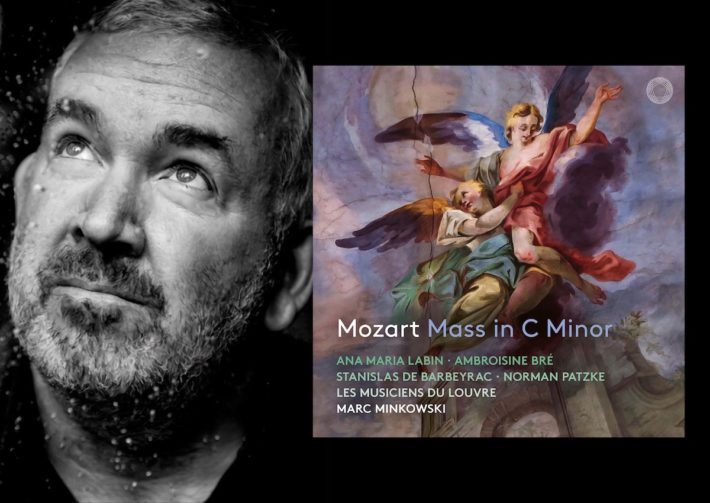During his career, Mark Minkowski has proven to be a somewhat controversial conductor. His recording of Haydn’s “Surprise” Symphony No. 94 (Naïve/2010) has the orchestra yelling to augment the impact of the second movement’s unexpected forte chords, and in his two DVDs of Mozart’s “Requiem” (K.626) and “Davide Penitente” (K.469), the choral works accompany dancing horses! His first Mozart CD (Archiv/DG 2006) features exceptionally fast tempos for the final two symphonies, a proclivity also apparent in this new recording, which will most likely divide opinions as well.

Minkowski’s reading takes 48’21”, substantially faster than three excellent period-performances (Suzuki 52’02”/Gardiner 54’00”/Herreweghe 54’35”). While the impassioned virtuosity of Les Musiciens du Louvre in the above-mentioned symphony recording makes for thrilling listening, in the Mass Minkowski’s tempos feel unrelenting, especially in the arias, depriving both singers and players from exploring the varying emotions of the Mass text.
The “Kyrie” is an exception, perfectly paced, the choir’s initial entrances strikingly laid out as they cry out for God’s mercy. Minkowski ensures the orchestral bass line is prominent, adding an ominous element to the choir’s petition. Ana Maria Labin’s first entrance (2’21”) is sweetly sung, but her phrasing is rather four-square and unimaginative when compared to Carolyn Sampson for Suzuki.
Tempos become more problematic in the “Gloria.” The opening section is joyful but hard driven and asking the choir to make the “in excelsis” statements get louder with each repetition (track 2, 0’38” and 1’23”) comes across as mannered and hectoring. “Laudamus te” (3) is impressively sung: Ambroisine Bré has just the right color for this melismatic music, though in high lying passages there are a few instances where her sound seems to harden. Minkowski’s “Gratias” tempo (4) is significantly faster than his colleagues, stripping the music of the awestruck feeling Gardiner and Herreweghe convey. In the “Domine” (5) duet, Minkowski ensures the contrapuntal accompaniment is clearly rendered, but both singers seem unable to relax into his tempo. There is a slight sense of anxiety in their sound, and when the text’s mood changes (Lord, God, LAMB of God 1’40”) the vocal color and articulation does not.
The following “Qui Tollis” features another unconvincing interpretative idea. Minkowski has the soft sections sung by soloists instead of the choir. I found no precedent for this in the two scores I consulted, and it adds nothing but an unwanted novelty. “Quoniam” (7) is dispatched with an incessant momentum that seems almost glib when compared to the nuanced reading by McNair, Montague, and Rolfe-Johnson under Gardiner. The final two sections, “Jesu Christe” and “Cum Sancto Spiritu” are fully convincing, with impressive unanimity and brilliance from both choir and orchestra.
In the “Credo”, Minkowski’s interpretative stance is to highlight the technical virtuosity of forces at the expense of mining the varied drama and emotion of the text. This was unexpected, because in his recordings of Bach’s “Mass in B Minor” and “St. John Passion,” tempo choices are clearly motivated by the text. Interestingly, the “Sanctus” and “Benedictus” have timings close to Gardiner, Herreweghe and Suzuki, and in the “Benedictus” Minkowski’s soloists finally become fully expressive.
Pentatone’s ancillary materials are excellent and the recording is very fine. There is a natural balance between the soloists and choir, and the engineers have placed that the choir forwardly in the mix, ensuring they have equal presence with the orchestra. Diction and balance between sections is impressive, and their tutti sound is often spine-tingling. With these forces the performance should be more impressive than it is. Each listener will have to decide whether Minkowski’s interpretative ideas are convincing and remain so on repeated listening.
Mozart – Mass in C Minor, K. 427
Ana Maria Labin – Soprano
Ambroisine Bré – Mezzo-Soprano
Stanislas de Barbeyrac – Tenor
Norman Patzke – Baritone
Les Musiciens du Louvre
Marc Minkowski – Conductor
Pentatone, CD PTC5186812




















